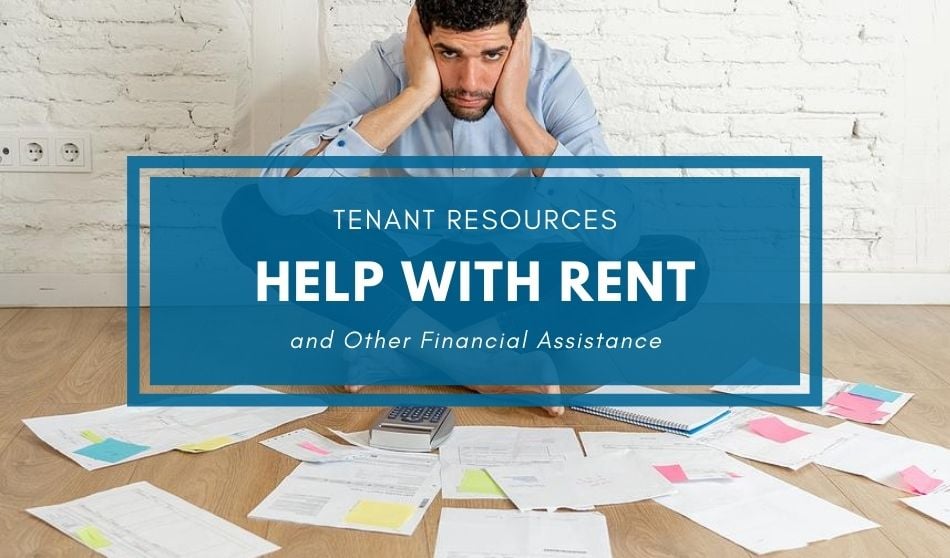
Do you need help with rent and other financial assistance or know a renter struggling to make ends meet? You’re not alone! There are over 44 million on unemployment, 23 million at risk of eviction, and millions more barely making it paycheck-to-paycheck.
Getting through financial hardships isn’t easy so finding help with rent and other financial assistance is important to support efforts toward a more hopeful tomorrow.
The internet has a plethora of suggestions emphasizing budget cuts and leaning on family and friends for support. But if you’ve exhausted those resources, before you max out and pay rent with credit card transactions, check out the below useful ideas, funding opportunities, and agency links to research that may get you through these tough times.
Banks and Credit Unions
Check with your local bank or credit union. Some have received grants and are distributing funds in the community. These funds for the general public might not require an account or membership.
National and Community Outreach Organizations
Modest Needs
This organization offers grants up to $1000 with payments made directly from them to the creditors or vendors. To learn more visit: modestneeds.org/about-us/
United Way
National recognized organization, the United Way providing support and resources across the country. The United Way COVID19 resource has handy information including a sample email template to use when working with your landlord. Visit this directory to find your local United Way office: unitedway.org/find-your-united-way.
211
The United Way provides very useful region resource information by phone or online. Similar to calling 911 for emergency assistance, dial 211 on your phone to find rental assistance programs and other helpful resources in your area. The same information is available online at 211.org
Community Action Groups
Across the country, there are organizations called to serve the community. These community action groups may go by different names. One resource to locating one in your area is provided by the National Community Action Partnership which offers this interactive map.
Faith-Based Financial Support
The Salvation Army
The Salvation Army may have rent assistance and other resources. Funds are typically limited to one-time assistance so check with your local Salvation Army for specifics.
Catholic Charities
Catholic Charities offers emergency assistance grants and other support in a variety of services.
Local Churches and other Religious Organizations
Call or go online and contact local churches to ask about programs they may offer for rent or other support efforts. There are many local churches and local chapters of faith-based organizations that are ready to serve such as the Society of St. Vincent De Paul.
City, County, and State Programs, Grants, and Loans
Hop online or grab your phone and reach out to your city, county, and state as each might have funds set aside to help the community at large.
For example, the state of Illinois is offering a $5,000 relief program to help with rent and Oregon just launched a one-time COVID-19 $500 emergency relief check program for those eligible. So be sure to contact your state and ask if there are programs in place or coming soon.
A county-level example of available support is in Multnomah County, Oregon which offers short-term help with emergency housing vouchers, rent, and mortgage payments, and other housing costs based on income.
Remember to check with those state and local agencies often as legislation continues to be introduced changing the available resources. California for instance has a few rent assistance bills in the works that if passed would have the state pay the landlord and give the tenant up to 10 years to pay the state back, alleviating the fear of eviction for non-payment.
Check out this handy guide to state-by-state tax information, deadlines, and resources: Coronavirus Tax Breaks for US Citizens
In locating additional state-specific COVID19 resources including financial aid, turn to this Ultimate State Guide: Ultimate State Guide to Coronavirus Information
Department of Social Services
In line with reaching out to government agencies, find out what resources the Department of Social Services has to offer in your area as they often have help for emergency rent assistance. The Office of Administration for Children and Families (ACF) provides states with grants to disburse to families in need.
One such social service program is called Temporary Assistance for Needy Families (TANF). You can locate your state TANF program contact using this directory. The Department of Social Services can also help with child care costs and help with job search resources.
Federal Resources and Relief
Usually, most federally funded relief is provided directly to each state, territory, and district to be administered through those state agencies. But that doesn’t rule out receiving Federal aid completely. If you have not received a Federal stimulus payment, you might still qualify. The Internal Revenue Service (IRS) provides information here: Coronavirus Tax Relief and Economic Impact Payments
Additionally, if your income has significantly reduced, you may qualify for the Federal housing voucher program. And the US Department of Agriculture (USDA) has grants and loans available as well.
Lower Income Housing Options
If you need to move to find affordable housing options a quick internet search should help you find programs that offer publicly subsidized housing and privately owned subsidized housing such as the HOME program. The Section 8 program not only offers ongoing rent subsidies but may also provide utility funds; both of which are then directly paid to the landlord.
Renters Who Are Business Owners
Check with your city, county, and state for business grants and loans including economic development aid. Check the fine print to see if you can use those funds for personal finance concerns. If only to be used for business-related expenses, that still should offer some relief.
Help with Necessities
Throughout communities, there are food banks ready to lend a hand by providing staples. Federal resources are also available such as the Supplemental Nutrition Assistance Program (SNAP). Check with your utility company for energy-efficient appliance discounts. They might also provide free LED lightbulbs and other energy-efficient suggestions.
As with any of the above, it may be that they only offer assistance with access to groceries or help with utility bills but any little bit helps bring down expenses to help with rent obligations.

What to do When Behind on Rent
This is a stressful time, no doubt. When stress bangs at the door the response is either fight, flight, or freeze which are all reactive states. To move past the urge to run and hide or freeze up, take small steps to dispel procrastination – any step forward can help create a state of hope.
Take Inventory
It’s hard to move forward unless you know what you are facing. The first step in preparation and knowing where you stand financially is to take inventory of your situation which requires looking at the big picture as well as the small details.
- Log into your tenant portal to access the latest invoice and get an understanding of outstanding rent charges, late fees, etc.
- Grap a copy of your financial bank statements to get a picture of current spending habits and account balances.
- Gather credit card statements and all outstanding bills.
- Read your lease to know what happens if you miss a payment.
Put it in Writing
Create either a spreadsheet or a simple list of all outstanding debts, recurring expenses, necessities, and income. Unless it’s all in one place, the numbers are just hypothetical. If you use a spreadsheet you’ll be able to track payments and dates and watch the balances decrease. Tracked items are more likely to get attention and not be forgotten.
Create a column for (or write down) the contact information for every vendor, service provider, and creditor to have handy for the following step.
Communicate with Creditors
One by one, call each creditor, including your landlord to explore options and seek suggestions to help you meet your obligations. For example, ask if they can waive late fees, extend due dates, or even reduce minimum payments due. This one step alone may help free up extra funds.
Direct the conversation away from making payment plans or schedules if possible until you are finished with your research and formulate a budget. But assure them a call back to formalize a payment plan as soon as possible.
Plan for Success
Seek wise counsel and reach out to as many of the above resources as possible. Weigh and discuss options with significant others, such as family, and friends.
If you are considering a move to reduce costs, before breaking the lease understand that you are still responsible for the outstanding rent balance and take into account additional costs of a move. You may find the moving van, loss of deposits, and the costs of breaking a lease may not be worth the effort compared to working with your current landlord.
Lastly, communicate with your landlord and other creditors. Let them know your intension; whether that is to move, pause services, cancel cards, payment arrangements, or the like. They will appreciate knowing your plans and may even help with suggestions or resources to make your goals achievable.






Please l need help with this rent. Am so behind still suffering Covid 19 stressing out
I hear your distress, Tammera and I know that mounting stress can make reaching out for help difficult. Hopefully, you are able to find help or at least can be pointed in the right direction using the suggestions in this article and 211.org is a good place to start. Also, because most federal rent assistance is being distributed by cities and counties, reaching out to your city and county is another good first step. I do hope something in the article will assist you in locating the help you need quickly.